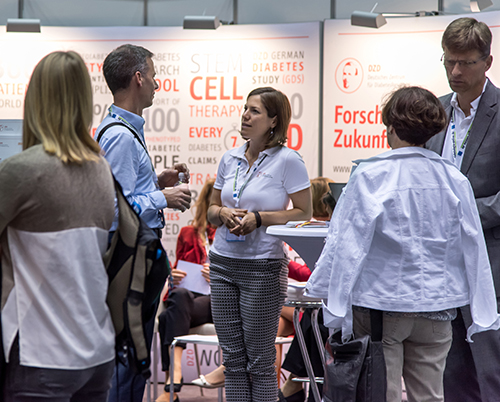Neuherberg, 27.05.2019
Innovative Diabetes Research for Future Care
Currently, about seven million people in Germany suffer from diabetes. The incidence is rising rapidly: By 2040, the number of people with diabetes is projected to increase to 12 million1. But how can the metabolic disease be treated or even prevented? Specialists from various disciplines work together at the DZD to develop tailor-made approaches for the prevention, diagnosis and treatment of diabetes and thus combat the widespread disease. In various symposia at the Diabetes Congress (May 29 - June 1, 2019, Berlin), DZD researchers will present current highlights of their work.
The German Center for Diabetes Research (DZD) was founded ten years ago to transfer findings from diabetes research as quickly as possible from the laboratory to clinical studies and then to patients. Highlights of this translational diabetes research and its transfer into practice will be presented by the DZD and the German Diabetes Society (DDG) in the symposium Innovative Diabetes Research and Future Care – Diabetology 4.0. The symposium will be chaired by Congress President Professor Michael Roden.
In a panel discussion, scientists of the DZD (Professor Martin Hrabě de Angelis, Professor Hans-Ulrich Häring) and physicians of the DDG (Professor Dirk Müller-Wieland, Professor Baptist Gallwitz) will share their perspectives on how the research work of the DZD helps to lay the foundations for innovative prevention and treatment procedures. The focus will be on the subtypes of prediabetes and type 2 diabetes discovered in multicenter studies that were, among others, conducted under the auspices of the DZD. The studies show that patients suffering from specific subtypes have a high risk of diabetic complications. These findings now open up the possibility of developing specific prevention approaches and treatments for the different types of prediabetes and type 2 diabetes.
Another focus of the panel discussion will be the question of how the digital transformation can help people with diabetes. Digitalization will enable diabetes research to take on a new dimension. Modern technology such as artificial intelligence and data mining can be used to identify patterns in data and thus other subtypes of diabetes and prediabetes.
In order for diabetology to remain fit for the future, well-trained clinical scientists and diabetologists are also needed. Professor Annette Schürmann and Professor Monika Kellerer will explain how the DDG and the DZD promote training. The symposium "Innovative Diabetes Research and Future Care – Diabetology 4.0" will take place on May 31st at 4:30 p.m.
Experts of the DZD will also present current research results in symposia. The symposium Liver or CNS – Causes of Diabetes (May 30, 8:30-11:00 a.m.) will highlight the role of the liver and the brain in the development of diabetes. Under the heading Dealing with Big Data in Diabetes, DZD researchers will present how diabetes research can gain new insights by using large data sets and intelligent IT (June 1, 9:00-10:30 a.m.).
DZD experts will also speak at other Congress symposia and workshops.
Congress participants can obtain information about the work of the DZD at the DZD stand in the Diabetes Forum.
1) Tönnies, T. , Röckl, S. , Hoyer, A. , Heidemann, C. , Baumert, J. , Du, Y. , Scheidt‐Nave, C. and Brinks, R. (2019), Projected number of people with diagnosed Type 2 diabetes in Germany in 2040. Diabet. Med. DOI.org/10.1111/dme.13902
Press contact

Birgit Niesing
niesing(at)dzd-ev.de
+49 (0)89 3187-3971

